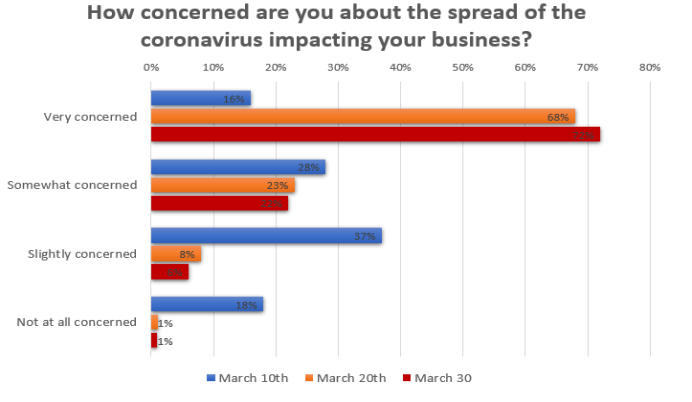The NFIB Research Center’s latest survey on the current impact of the COVID-19 outbreak on small business shows continued deterioration of the small business sector. The severity of the outbreak and regulatory measures that cities and states are taking to control it are having a devastating impact on small businesses.
Currently, 92 percent of small employers are negatively impacted by the outbreak of the novel coronavirus, a continued escalation from 76 percent of small employers reporting negative impacts 10 days earlier. About 3 percent are positively impacted. These firms are likely experiencing stronger sales due to a sharp rise in demand for certain products, goods, and services. This will likely ease in the coming weeks as consumers feel more secure about their personal supply levels.
“As you can see from the current survey, it is getting progressively dire for small businesses and their employees in Iowa. Although small business owners tend to be resilient, the current trend is unsustainable,” said NFIB State Director in Iowa, Matt Everson. “To help with some of the lost revenue, we encourage all small businesses to contact their financial institution as soon as possible to explore all funding resources that the federal government has begun to provide.”
Starting Friday, small business owners can begin applying for the Paycheck Protection Program. NFIB is encouraging members to apply as soon as possible since there is a funding cap.
In Des Moines, commercial contractor Heartland owner Scott Turczynski is prepared to apply for the Paycheck Protection Program. What worries him most is unemployment. A few of his carpenters have been afraid to come into work and with recent changes to unemployment restrictions, his employees can now get unemployment benefits from the state and money from the federal government under the recent CARES legislation for that reason. He’s fearful that all of his employees will now stay home.
“Once word gets out about this, we will get everyone asking to stay home. Why, wouldn’t you?” said Turczynski. To counter this, Turczynski is offering his employees a hazard bonus: an extra $5 an hour for his field crews over the next eight weeks.
“We are business as usual with an asterisk. The asterisk is the unknown that constantly weighs us down. We are still working on all of our projects, but the shoe will drop at some point I’m guessing.”

Almost all small employers are now impacted by economic disruptions related to COVID-19. Only 5 percent of small businesses are not currently affected by the outbreak. Of these businesses, 44 percent of them anticipate that changing if the outbreak spreads to, or spreads more broadly in, their immediate area over the next 3 months.
Among negatively impacted small employers, 80 percent report slower sales, 31 percent are experiencing supply chain disruptions, and 23 percent report concerns over sick employees.
How long can small businesses continue to operate under current conditions? About half of small employers say they can survive for no more than two months, and about one-third believe they can remain operational for three to six months. Not surprisingly, many small business owners are anxious to access financial support through the new small business loan program to help alleviate some of the financial pressures building up. About 13 percent of small employers are not as severely impacted and expect to remain open indefinitely.

Almost all small business owners are taking some sort of action in response to the outbreak by adjusting to changing economic conditions or protecting themselves from potential disruption. Just 5 percent of owners have not taken any action in response to the outbreak, a marked departure from more than half (52 percent) not taking action three weeks ago. Actions taken by most small employers are those related to recommended CDC steps to protect and prevent the spread of COVID-19 in the workplace including talking to employees about hand washing and social distancing, and disinfecting and cleaning offices and workplaces more frequently. Another 56 percent have scaled down or adjusted business operations, and 26 percent have delayed payments to creditors.

The level of concern among small business owners about the coronavirus impacting their business has elevated significantly over the past three weeks. About 72 percent of small business owners are “very” concerned about its potential impact on their business now compared to 16 percent on March 10th. Another 22 percent are somewhat concerned, and 6 percent are slightly concerned. Just one percent are not at all concerned.
Due to escalating financial stress on the small business sector, more small businesses are talking with their bank about financing needs than was the case 10 days ago. About 29 percent of small employers have talked with someone at their bank or with the Small Business Administration about finance options, and 23 percent are planning to do so soon. Another 38 percent of small employers have not, and do not, intend to do so.

The CARES Act includes new small business loans through the Paycheck Protection Program (PPP). Almost two-thirds of small employers plan to apply for the loan. The PPP is another targeted loan assistance program to help small businesses weather the rapidly changing economic crisis.
The vast majority of small businesses are now impacted by the COVID-19 outbreak, and owners are taking the threat to their business seriously. Many owners have already sought out financial help and more are planning to do so in the near future. The outbreak has left few, if any, owners unscathed. The economic impact is immense, and now, the questions are how long will it last and how quickly can the small business sector recover once on the other side.
Methodology
This survey was conducted with a random sample of NFIB’s membership database of about 300,000 small business owners. The survey was conducted by email on March 30, 2020. NFIB collected 1,172 usable responses, all small employers with 1-465 employees.




